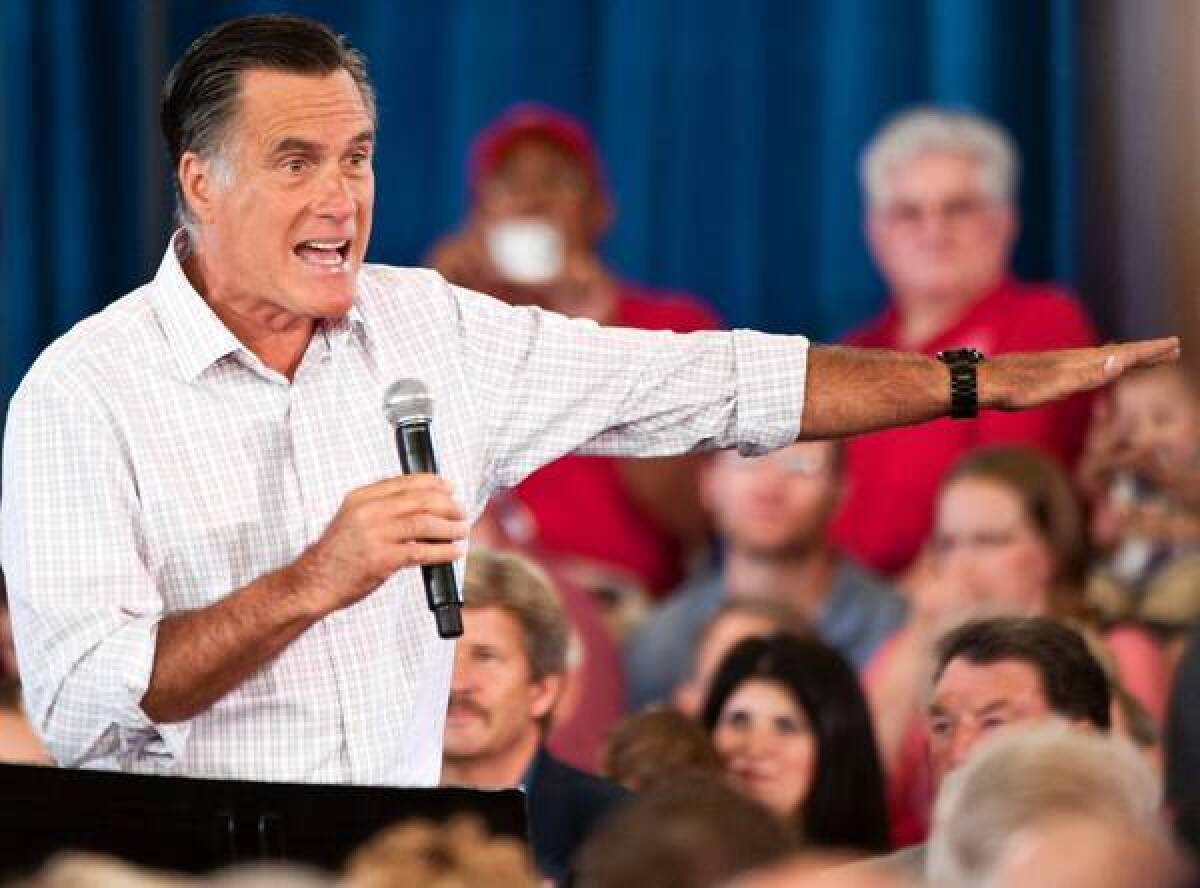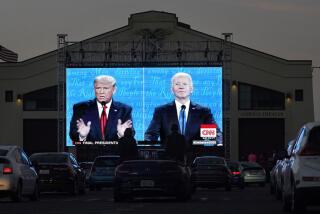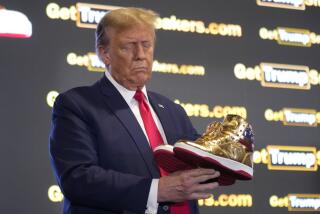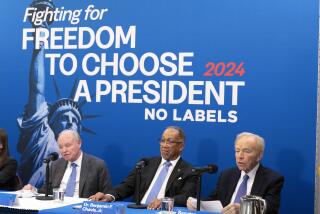Defining Mitt Romney: Obama has a head start

- Share via
WASHINGTON — Mitt Romney is now out-raising President Obama’s campaign money machine, the most prodigious in history. But nervousness has crept into Republican ranks because the unofficial nominee hasn’t fully defined himself in voters’ minds — something the president has been eager to do for him.
Obama’s attacks on Romney’s personal wealth and his work as a private-equity specialist are hurting the GOP candidate, say strategists in both parties. Two months of negative ads authorized by the president — some of them criticized by independent arbiters as misleading and inaccurate — have taken a toll on Romney’s standing in battleground states, polls show, even if the election overall remains up for grabs.
More recently, Democrats, led by Obama himself, have demanded that Romney release more of his tax returns and have fired anew at the wealthy candidate’s now-closed Swiss bank account and other foreign investments. A Romney spokeswoman has dismissed the attacks as an “unfounded character assault” and an obvious effort by Obama to change the subject in the face of persistently high joblessness and a weak economic recovery.
Romney partisans acknowledge the importance of defining their candidate. Republican consultant Rob Stutzman said that voters “have soured on the president. The question is: Are they willing to turn the keys over? There’s an important element that lies ahead for Gov. Romney, who has to tell people what he’ll do [as president], and do so with his own voice in his own ads.”
Obama’s effort to define Romney follows traditional campaign tenets. “Obama’s path to victory is to make Mitt unelectable, and they can,” said an advisor to one of Romney’s potential vice presidential picks, who like several GOP strategists interviewed for this article sought anonymity to speak candidly about the campaign. “You’ve got to find a guy’s weakest point and attack him on it. Will it work? Don’t know. We’ll have an election.”
A former aide to a Republican presidential nominee pointed out that whoever defined his opponent first had an advantage in politics — and said that he found it both surprising and troubling that Romney had yet to flesh out his biography.
“I get it that the objective of the Romney campaign is to make this a referendum on Obama, but at some point you have to say something about your guy. People develop a personal relationship with their president. You have to know something about the guy you’re making president,” he said. “I don’t know if people see Romney as president.”
Practical constraints, rather than strategy or tactics, may have had something to do with the absence of advertising reinforcing a positive Romney image. Spokeswoman Andrea Saul said this week that Romney was hampered by federal election law from spending much of his growing cash hoard until after he formally becomes the Republican nominee late next month. Federal Election Commission records show that as of May 31, Romney was spending nearly all of the money designated for the pre-convention period as fast as it came in.
Republican “super PACs” have more than taken up the slack, financing an unrelievedly negative tsunami of anti-Obama ads in key states. But the ads have been ineffective so far in opening up an advantage for Romney. And if he waits until the GOP convention, still seven weeks away, to introduce himself more fully to the country, he risks suffering further damage from the Democratic onslaught.
“July and August are historically the defining moments of a national campaign, prior to the conventions and debates. Voters’ minds are starting to be shaped and now is the time to set the terms of the debate, especially with independents,” said Scott Reed, who managed the 1996 campaign of Bob Dole, the last Republican to challenge a Democratic incumbent.
At least one Republican strategist questioned the extent to which Romney was likely to mount much of a positive ad campaign.
“He went through the primary and basically found that running a lot of negative spots worked best for him,” said Paul Wilson, whose firm has worked with American Crossroads, a super PAC co-founded by Karl Rove. “I’m not buying it that they think they have to have a totally new, positive message for months here.”
Romney is being pressured to counter Democratic attacks on his net worth — estimated at $250 million or more. He released his 2010 tax return last winter, but only after prodding from Republican primary opponents. This week, Obama made a pointed reference to George Romney — who released 12 years of income tax returns during his 1968 presidential try — and called on the younger Romney to make a fuller disclosure.
Some Republicans are surprised that Romney had allowed the matter to fester.
“America stipulates the fact that he’s rich. To remain silent on it suggests there’s something he’s hiding,” said Stutzman, who ran Romney’s 2008 California campaign but isn’t directly involved in the current effort. “You just need to explain it and move on. Americans just want to be reassured that there is nothing that was ever done that was wrong.”
Democratic consultant Bill Carrick said that Republicans were right to be concerned about Romney’s image but that he doubted it could be changed over the next few months. The Republican candidate has defined himself as a successful businessman, said Carrick, but he drew a contrast between Romney and wealthy politicians of the past.Franklin D. Rooseveltand the Kennedy brothers “seemed to have a very good sense of how to communicate with people about their own economic situation, and do it in a way that gave people hope and confidence that they were on their side.”
“The danger for Romney,” he added, is that the relative handful of voters who are still undecided “goes from wondering whether he understands real people’s difficulties to saying, ‘No. He doesn’t get it. He’ll never understand what we’re going through.’ If that settles in over the summer, that’s a helluva big problem.”
Melanie Mason in the Washington bureau contributed to this report.
More to Read
Get the L.A. Times Politics newsletter
Deeply reported insights into legislation, politics and policy from Sacramento, Washington and beyond. In your inbox twice per week.
You may occasionally receive promotional content from the Los Angeles Times.










